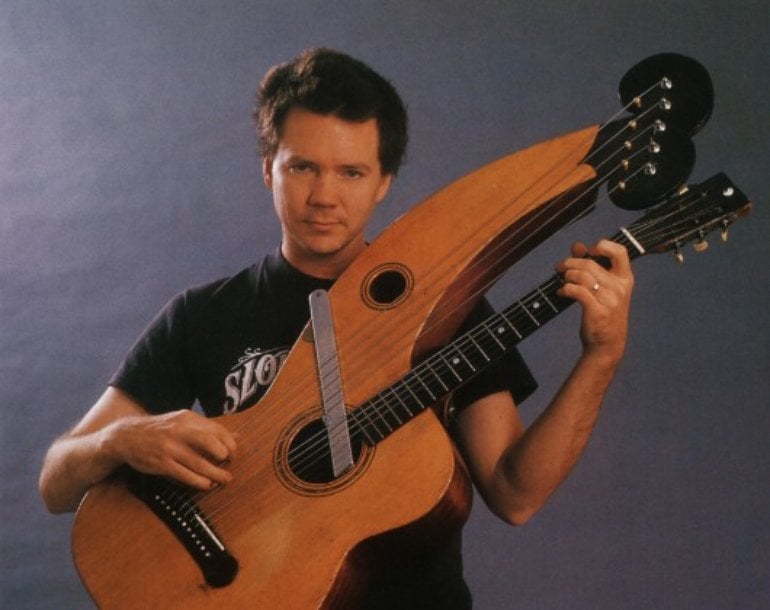December 2, 1997 Michael Hedges died in a car crash
Hedges was born the son of Dr. Thayne Alden Hedges and Ruth Evelyn Hedges Ipsen. His life in music began in Enid, Oklahoma, as he flirted with various instruments before focusing on flute and guitar. He eventually enrolled at Phillips University in Enid to study classical guitar and composition under E. J. Ulrich. Subsequently, Hedges studied as a composition major at Peabody Conservatory in Baltimore, Maryland, where he applied his classically trained musical background in combination with various unusual techniques to the steel-string acoustic guitar. While at Peabody Michael met and married a fellow Peabody student, Mindy Rosenfeld and had two sons, Mischa and Jasper.
Hedges covered a wide range of musical styles and was considered an extremely dynamic performer in concert. He made ends meet playing and singing in pubs and restaurants in the Baltimore Metro area during his tenure at Peabody. From 1976 to 1977 he played electric guitar and flute for a local jazzy folk rock group called Lotus Band, which he left to start performing solo acoustic. In 1980, he made plans to move to California to study music at Stanford University. He was contacted in February 1981 by William Ackerman who heard Hedges performing at The Varsity Theater in Palo Alto and immediately (using a napkin from The New Varsity) signed Hedges to a recording contract on the Windham Hill label.
Hedges’ first two recordings for Windham Hill, “Breakfast in the Field” and “Aerial Boundaries,”were milestones for the acoustic guitar. He wrote nearly exclusively in alternate tunings. His early recordings and most of the Breakfast in the Field album were recorded on the Ken DuBourg guitar and his Martin D-28 “Barbara.” “Aerial Boundaries” earned Hedges his first Grammy nomination, and with the release of 1985’s “Watching My Life Go By,” Windham Hill agreed to create a subsidiary imprint, Open Air, to further distance his music from the increasing confinements of the new age tag. Some of the techniques he used include slap harmonics (created by slapping the strings over a harmonic node), use of right hand hammer-ons (particularly on bass notes), use of the left hand for melodic or rhythmic hammer-ons and pull offs, percussive slapping on the guitar body, as well as unusual strummings. He also made extensive use of string damping as employed in classical guitar, and was known to insist strongly on the precise duration of sounds and silences in his pieces. He also played guitar variants like the harp guitar (an instrument with additional bass strings), and the TransTrem Guitar. He was a multi-instrumentalist, playing piano, percussion, tin whistle, harmonica, and flute, among others on his albums. Bassist Michael Manring contributed to nearly all of Hedges’ records.
Frustrated that his published work reflected only the instrumental side of his creative output, Hedges convinced Windham Hill to release “Watching My Life Go By,” a 1985 studio recording of Hedges’ vocal originals written over a span of five years, songs often performed at his concerts leading up to the album’s release. His fourth album, a live recording called, “Live on the Double Planet,” was assembled from 40 of his live concerts captured from 1986 to 1987 recordings. Subsequently, Hedges earned the freedom to release his albums with both vocal and instrumental songs.

Hedges had a very broad range of influences and his output spans many genres. His musical education was largely in modern 20th century composition. He listened to Martin Carthy, John Martyn, and the Beatles, but his approach to composition owed much to Igor Stravinsky, Edgard Varèse, Anton Webern, and Steve Reich, in addition to experimental composers such as Morton Feldman. He saw himself as a composer who played guitar, rather than a guitarist who composed music. He was often categorized as a new-age musician because of his association with the Windham Hill record label. Somewhat in reaction to this, he described his music as “Heavy Mental,” “New Edge,” “Acoustic Thrash,” “Deep Tissue Gladiator Guitar,” or “Savage Myth Guitar” among other terms. He often flirted with rock and pop, and included in his repertoire acclaimed covers of Bob Dylan’s “Like a Rolling Stone” and “All Along the Watchtower.”
Hedges toured briefly as a co-bill with Leo Kottke. These shows included solo performances by Kottke and Hedges and, as a finale, a number of duets including performances of Kottke’s “Doodles” with Hedges playing a high-strung parlor guitar. Hedges’ 1984 “Aerial Boundaries” album included a tribute piece for the works of acoustic guitarist Pierre Bensusan, simply entitled “Bensusan.” “Bensusan” posthumously returned tribute on his 2001 release “Intuite (“Favored Nations)” with the composition entitled, “So Long Michael”. After his death, his album “Oracle” won the 1997 Grammy Award for Best New Age Album. His final recording, the acoustic “Java Man,” appeared on the 1998 compilation “The Sounds of Wood and Steel.” “Torched” followed a year later. The compilations “Best of Michael Hedges” (2000), “Platinum & Gold Collection” (2003), and “Pure Michael Hedges” (2006) were all released posthumously on Windham Hill.READ SOURCES
https://acousticlife.tv/michael-hedges/
http://www.nomadland.com/Bio.htm
https://web.archive.org/…/concerts…/pn/jan98/hedges.html
https://www.allmusic.com/…/michael-hedges…/biography
https://www.geni.com/…/Michael-Hedges/6000000001819694091
https://www.innerviews.org/inner/hedges.html
https://en.wikipedia.org/wiki/Michael_Hedges
